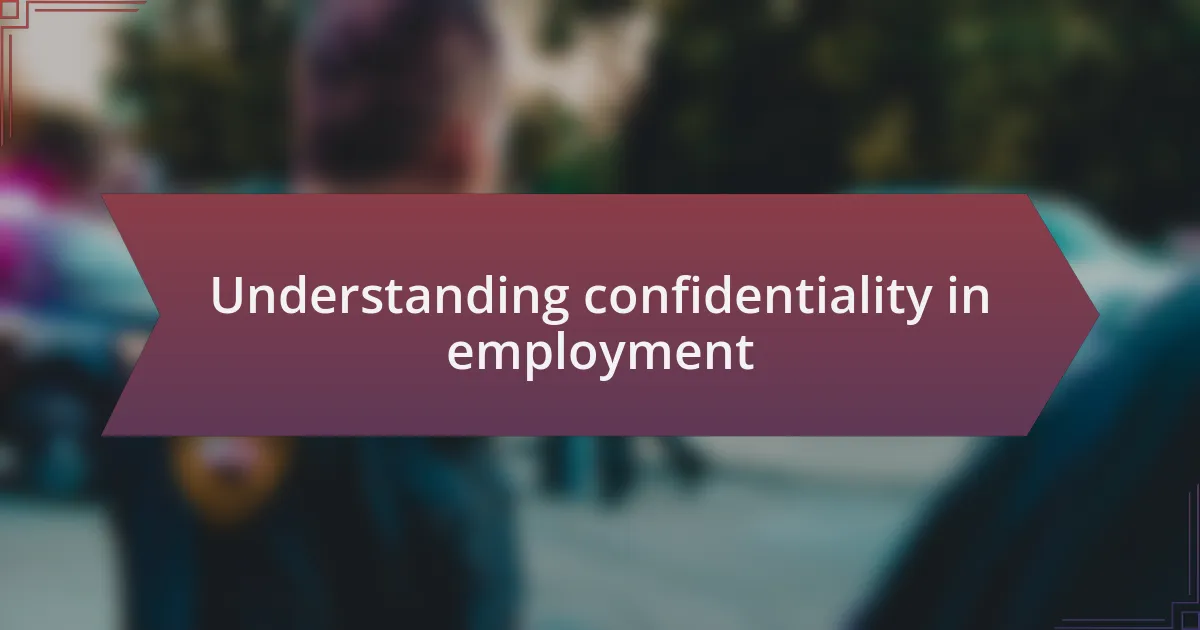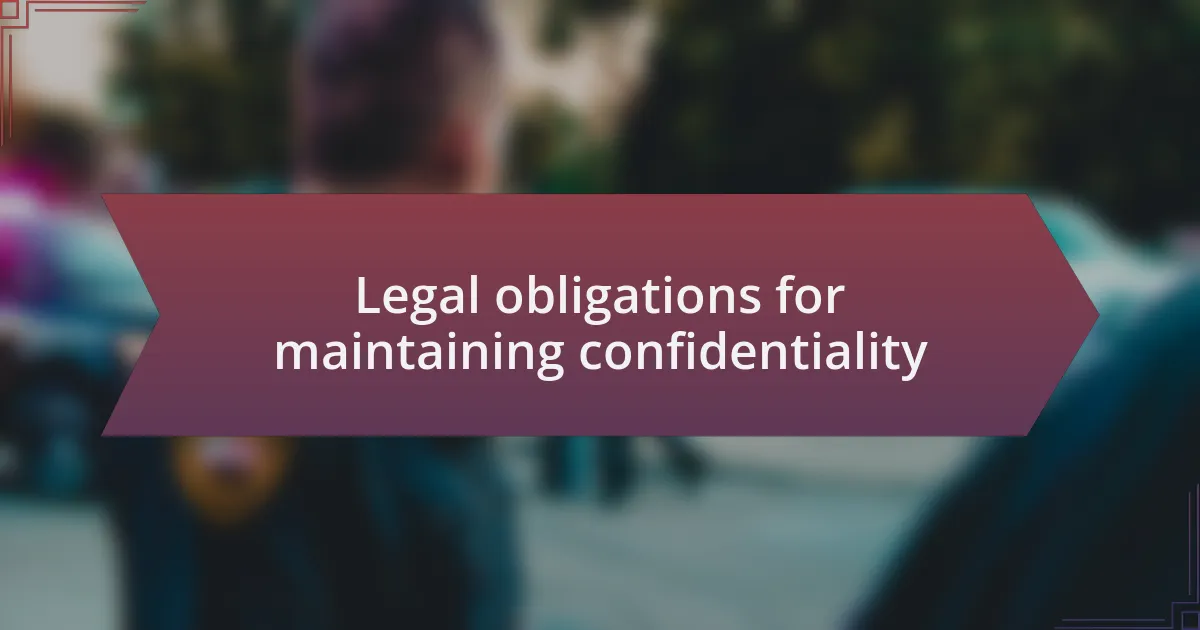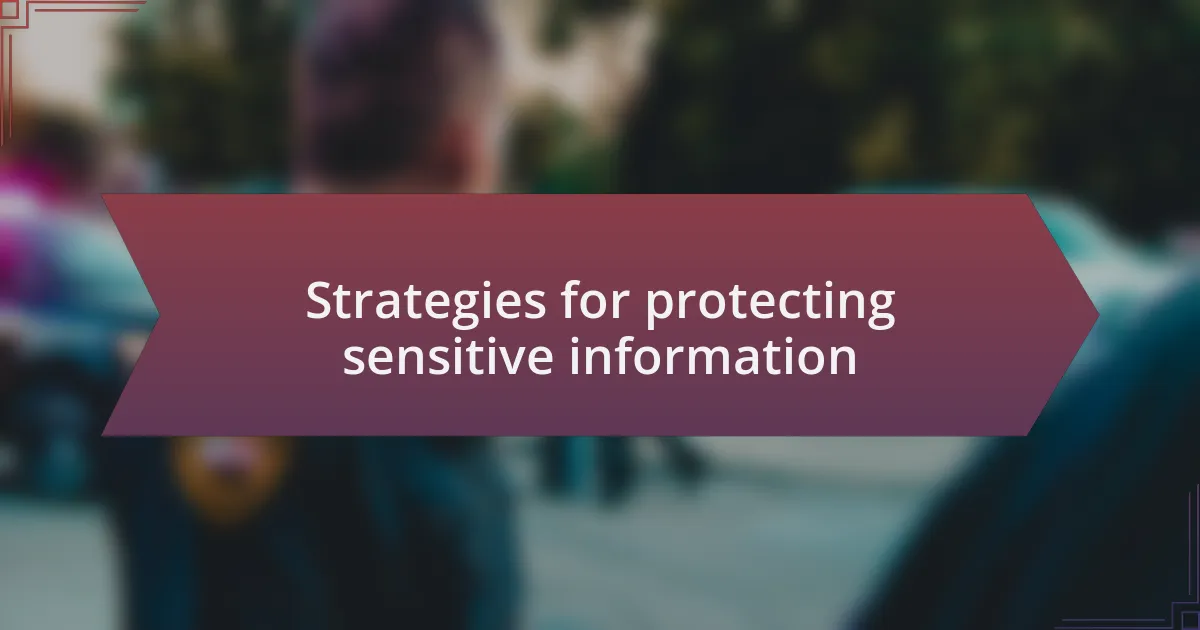Key takeaways:
- Confidentiality in employment fosters trust and a respectful culture; breaches can have significant consequences for relationships and reputations.
- Legal obligations, including laws like HIPAA, require strict adherence to confidentiality, with serious repercussions for non-compliance.
- Implementing strong access controls, regular employee training, and data encryption are critical strategies for safeguarding sensitive information.
- Creating an open environment for discussing confidentiality concerns enhances awareness and commitment to best practices among employees.

Understanding confidentiality in employment
Confidentiality in employment is more than just a legal requirement; it’s a fundamental aspect of trust between employers and employees. I remember working on a team project where sensitive information was involved, and the way everyone handled that information demonstrated our commitment to each other and the organization. Have you ever felt uneasy about sharing an idea because of potential leaks? It’s these little moments that make confidentiality so crucial.
When I reflect on my own experiences, I realize that breaches in confidentiality can lead to significant consequences. For instance, I recall a situation where a colleague inadvertently shared private client details, which not only damaged our professional reputation but also strained team relationships. This insight makes me wonder: how well do we communicate the importance of confidentiality to new hires?
Confidentiality is not just about policies; it’s about creating a culture of respect. In my view, each interaction is an opportunity to reaffirm this value. Have you considered how your daily practices contribute to a secure environment? I believe that by fostering open dialogue and transparency, we can empower everyone to prioritize confidentiality as a shared responsibility.

Legal obligations for maintaining confidentiality
Legal obligations surrounding confidentiality vary by jurisdiction but generally encompass a range of legal requirements that employers must adhere to. For instance, laws like the Health Insurance Portability and Accountability Act (HIPAA) in healthcare require strict adherence to client privacy. I once worked with a healthcare provider where team members underwent extensive training on these laws, reinforcing how seriously the industry takes confidentiality. Have you ever wondered how such regulations impact the daily operations of businesses?
In addition to specific laws, employers have a common law duty to protect confidential information. This obligation often extends to employee records and trade secrets. I recall advising a startup on how they could safeguard their intellectual property, highlighting the sheer risk of releasing information without adequate protections in place. It made me realize just how vital these guidelines are for the stability and integrity of any organization.
Moreover, breaches of confidentiality can lead to serious legal ramifications, including lawsuits and financial penalties. I encountered a case where a company faced a lawsuit due to an employee leaking sensitive information, which not only incurred hefty fines but also eroded client trust. It certainly makes me question: how often do organizations evaluate their compliance and risk-management strategies to avoid such pitfalls?

Strategies for protecting sensitive information
To effectively protect sensitive information, adopting strong access controls is crucial. In my previous role at a law firm, we implemented a tiered access system that allowed only specific employees to view critical documents. This not only limited the risk of unauthorized access but also fostered a culture of accountability—everyone understood the importance of safeguarding confidential data. Have you considered how access control might transform your own workplace dynamics?
Training employees on confidentiality policies is another vital strategy. I remember conducting workshops where we dissected real-life case studies of breaches, which vividly illustrated the risks involved. These sessions sparked genuine conversations among my colleagues about their responsibilities and the implications of negligence. How often do you refresh your team’s understanding of confidentiality in practice?
Lastly, encrypting sensitive data is a non-negotiable measure in today’s digital age. During a recent project with a tech start-up, we made it a priority to encrypt client data, which provided an extra layer of security even if a data breach occurred. It was reassuring to witness the team’s commitment to ensuring the information remained protected. Wouldn’t it be comforting to know that your critical data is shielded from prying eyes?

Personal experiences in maintaining confidentiality
Maintaining confidentiality is a constant balancing act, especially in a field where trust is paramount. I recall a situation where a colleague accidentally shared sensitive information in a group chat intended for more casual discussions. The immediate fallout taught us all just how fragile confidentiality could be in the age of digital communication. Have you ever encountered a similar lapse that prompted a reassessment of your own practices?
In another instance, while working on an employee relations case, we had to be meticulously careful about handling personal employee records. I remember the palpable tension in the room as we discussed the measures we had in place. The gravity of ensuring that no one felt their privacy was compromised weighed heavily on me. Reflecting on that experience, I often wonder if enough is being done across other sectors to truly protect personal information.
Moreover, I find that fostering an environment where employees feel comfortable discussing their concerns about confidentiality plays a critical role. Once, during a team meeting, I encouraged open dialogue about confidentiality challenges, which led to enlightening discussions and a newfound commitment among the team. Do you think creating a safe space for such conversations could lead to more robust confidentiality practices in your workplace?

Lessons learned from confidentiality breaches
Confidentiality breaches often reveal the vulnerabilities ingrained in our processes. I experienced this firsthand when a vendor mishandled a client’s sensitive data, leading to significant reputational damage for our organization. It was a stark reminder that even those outside our immediate team must be thoroughly vetted and trained on confidentiality practices. Have you considered how your external partnerships might impact your overall confidentiality strategy?
Another poignant lesson I learned arose from an internal investigation where an employee inadvertently accessed restricted information. The ripple effects were profound, not only affecting trust within the team but also prompting a scramble to reinforce our protocols. It made me reflect on the critical need for regular training and reminders about the importance of safeguards. Do your colleagues frequently discuss the potential repercussions of such lapses, or is it an unspoken concern?
Lastly, a breach I encountered made me realize the importance of a rapid response plan. I remember how the entire team rallied together to mitigate the fallout, but it was only after that incident that we established clear procedures for future breaches. This experience underscored the necessity of being prepared and the value of transparency in response efforts. How ready is your organization to handle a confidentiality breach if it happens tomorrow?